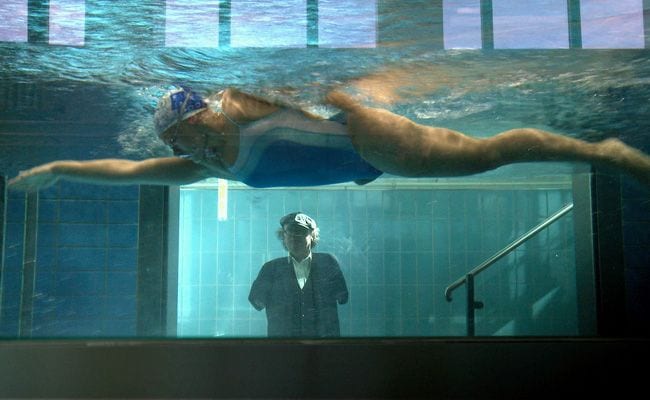
“To be honest, I don’t know why I’m doing this film, you know.” Niko von Glasow sits opposite his interview subject, Greek bocci champion Greg Polychronidis. As Greg waits and watches, Niko continues. “So basically, I think sports sucks and the Paralympics is a stupid idea… Maybe you can teach me why I’m wrong.”
So begins My Way to Olympia, premiering 7 July on PBS’ POV showcase, as much about von Glasow’s education as it is about Greg and several other Paralympians’ experiences at the 2012 Games in London. With each subject, the German director (himself a Thalidomide baby, born with undeveloped arms) is similarly candid, posing questions that tip between personal and provocative, comically self-deprecating and politically incisive.
The camera follows Niko as he makes his way along sidewalks and into training facilities. “Who are the other guys here?” he asks Greg when they meet, gesturing to two men who turn out to be his father and grandfather, both wholly dedicated to Greg’s goal of “being the best in the world” at what he does.
Such determined sense of purpose shapes the lives of the other athletes Niko visits, including Matt Stutzman, who calls himself the “Armless Archer“. Arriving at Matt’s home, where he lives with his wife and three sons out in the country so he can practice shooting, both bows and guns, Niko explains that his 14-year-old son Andre has come along because “He saw you and said, ‘I have to meet this guy.'” Matt does everything with his feet, from changing diapers to driving to loading his gun.
Niko makes a general comparison between the US, where guns are plentiful, and Europe, where they are not. When Matt suggests that people are still murdered in Europe, “stabbed with knives”, Niko observes, congenially, “If you wouldn’t be American, I would really send you to the doctor. You are the first person I meet who has a weapon.” When Matt offers to teach Niko to shoot, the filmmaker agrees to aim the gun, then Matt pulls the trigger with his toes. When Andre has the chance to shoot a gun himself, his face suggests he’s pleased, if somewhat surprised by the force of the weapon in his hands.
Niko makes clear his general antipathy to weapons — and especially, how they’re used by “ordinary” people — in a couple of other interviews. During his time with one-armed table tennis champion Aida Husic Dahlen, Niko wonders about her background, born in Bosnia and then adopted by a Norwegian couple in 1997 when she was six and a half. “I don’t remember those years,” she tells him, seated in the kitchen she shares with two roommates. “I’ve been told stories about my life.” When Niko asks whether she’s seen pictures of the war, she says no, her eyes wide and wet.
“Is this painful for you to talk about this time?” he asks gently. No, she shakes her head. Niko changes the subject, asking whether she has “mental advice to people who do sports.”
Niko’s education, subtle and less subtle, continues in his interviews with the Rwandan sitting volleyball team. One player reveals that he’s lost his leg to a landmine, yet he’s more interested in talking about his work as a missionary; another young man doesn’t have an answer when Niko, who explains that he once worked in Rwanda with refugees, asks whether he’s Tutsi or Hutu. “I don’t know,” the player says, “Why that question? That’s the past.” When Niko presses him, noting that it might be good for a child to identify “where he comes from,” and moreover, that “It’s very normal to know who you are,” the player counters, “We look forward to where we are going.”
As Niko listens, you might imagine his own assumptions might be changing along with your own. As much as the athletes’ personal and collective histories shape their current lives, the lessons they share extend beyond their ambitions to “be the best” at specific sports. If Niko begins with the notion that the Paralympics are a “a big show to disguise the big problem between normal society and the disabled,” he comes to see the athletes he meets as individuals, each with their own reason for pursuing a goal, and each with their own support system. These systems, you come to see, define and are defined by the goals, equally “normal” and “special.”
When at last the film offers brief and compelling footage of the athletes in competitions in London, its focus is on the alternately anxious faces of their relatives; Aida’s mother’s experience is especially thrilling, as she stands in aisle ways and next to railings, so excited she’s unable to sit near her husband until after Aida’s match.
A last scene occurs in a park, far from any sorts of crowds or fanfare, as Niko and Greg play a game of bocci in their own, utterly original way. When a park security official comes by, Niko deflects his concern that they’re playing illicitly, pointing out their disabilities as evidence that they couldn’t possibly be doing any such thing. It’s charming, their smiling deception, but even more than that, it makes clear the arbitrary dividing line between what’s “normal” and what’s not.


![Call for Papers: All Things Reconsidered [MUSIC] May-August 2024](https://www.popmatters.com/wp-content/uploads/2024/04/all-things-reconsidered-call-music-may-2024-720x380.jpg)



